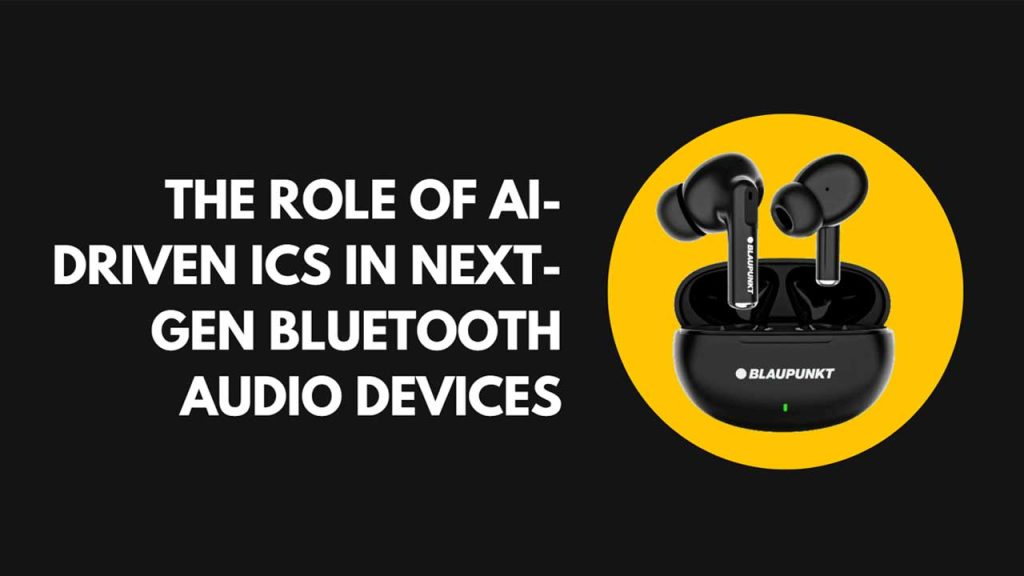With the onset of artificial intelligence (AI), audio devices using Bluetooth technology have progressed boundlessly. Initially, Bluetooth was developed to provide unrivaled wireless connectivity. However, today, AI-driven Integrated Circuits (ICs) are changing how we hear and experience sound. As a result, the evolution of Bluetooth technology has led to a shift in how audio devices perform, creating new possibilities for users. Bluetooth processors have revolutionized consumer audio devices, improving audio quality, enabling personalized listening, and enhancing other aspects of the industry. This rapid transformation has driven a surge in demand for smart audio tools, a trend that shows no signs of slowing down. MarketsandMarkets stated that the global AI-powered wireless audio device market is expected to grow 17.2% and reach around $206 billion by 2032. This growth can largely be attributed to the increasing need for advanced features like noise cancellation, real-time adjustments, and smoother integration into smart home technology.
In response to these demands, efforts in recent times have been focused on increasing the data rates and improving the audio codecs for better sound reproduction. These enhancements have paved the way for even more impressive developments. With the advent of Bluetooth Low Energy (LE), power utilization has also been significantly improved, leading to greater efficiency in devices without compromising audio quality. These improvements have set the stage for more sophisticated uses of the technology, particularly with the integration of AI. AI algorithms are now being embedded directly into ICs within Bluetooth audio devices, enabling real-time audio processing. As a result, these AI processors can analyse an audio signal or stream to filter noise, echo, and even amplify its clarity. By leveraging machine learning, the system can adapt to various acoustic environments, ensuring optimal sound quality regardless of external conditions. For instance, AI can help differentiate between irrelevant background sounds and the relevant sounds that are the focus of the listener, filtering out unnecessary noise for a better listening experience.
Moreover, AI and machine learning technologies do more than just enhance audio quality and they allow for a more personalised experience. Through the use of AI systems, audio settings can be tailored to meet individual preferences and listening habits, providing users with a unique experience each time they listen. This personalization extends even further with adaptive soundscapes that modify the audio output based on the user’s environment and activity, ensuring a truly tailored listening experience. The development of more powerful and efficient ICs has been crucial in making these capabilities possible. These advanced chips can handle complex AI algorithms without significant power consumption, making them ideal for portable devices. As a result, several companies are actively supporting the movement to integrate Bluetooth and Wi-Fi chips in their devices, seeking to increase functionality and deploy AI in innovative ways.
The audio industry is now undergoing a significant revolution, driven by the integration of advanced AI and ICs. These developments have brought about innovations like voice assistance, adaptive noise cancellation, and immersive sound systems. From consumer audio products to professional-grade sound equipment, these advancements are enhancing the intelligence and efficiency of sound systems across the board. As AI continues to evolve, everyone can anticipate even more sophisticated audio technologies that offer unparalleled sound quality and user personalization. However, even with these advancements, there are still challenges to overcome, such as power efficiency and the complexity of computation associated with AI integration in Bluetooth audio devices. Developers are currently working to overcome these obstacles by creating algorithms that strike a balance between optimal performance and battery conservation. These challenges are being addressed through intensive research into advanced ICs designed to function seamlessly with the latest AI technology while maintaining energy efficiency.
To sum up, the application of AI-enabled ICs in Bluetooth audio devices represents a major milestone in the evolution of sound technologies. This progression, from smart homes to smart sound systems, offers users enhanced audio quality, personalized experiences, and greater convenience, ultimately heralding a new era in the way we interact with audio devices.
Sukhesh Madaan , CEO , Blaupunkt Audio
